Open Education
Throughout my career I have always been an open educator. It has been natural for me to share both my ideas and resources with colleagues both immediate, and more broadly. However, with some of the work I have been undertaking with regards to EdTech and anti-racism I am very aware that doing so publicly potentially makes me a target for online abuse. Sometimes I have to take a deep breath, however, thankfully thus far I have not been targeted by trolls for this. But, I did receive an unkind critique on a quite personal blog post on how I think education could be. As I moderate the comments on the blog in question, I was able to prevent them becoming public.
I am also a proponent of Open Science, this is part of the reasoning behind my becoming a Carpentries Instructor and why when I worked with Research IT Services to produce online courses we chose to develop them using open access tools. I have recently had some discussions with senior colleagues within the faculty about what the open science agenda means for them, and practicalities of sharing data models and research outputs.
Mozilla Open Leaders programme
In autumn 2017 I was a round 4 participant of Mozilla’s Open Leadership programme. During the course I attended a number of workshops on the nature of open and how to facilitate an open project. The programme was an opportunity to further develop my understanding of Open and to kickstart the Data Literacy Playground project.
After successfully completing the programme I was invited to be an Expert or Mentor for future programmes. Due to work commitments I was listed as an Expert for round 5 and chose to be a Mentor for two round 6 projects, Equity Unbound and Good Enough Open Source Practices for Data Analysis in Python. Initially I was unsure of mentoring the Equity Unbound project as I was unsure as to what I could contribute. The project was led by Maha Bali, Catherine Conway and Mia Zamora, all of whom are quite prominent figures in Open Education. But, what I found was that I was able to make a valid contribution, predominantly in helping the project team to understand how the Mozilla programme applied to their project.
Open Education for a Better World (OE4BW)
In 2018 I responded to an open invitation to apply to become a mentor on the OE4BW programme, an international online mentoring programme supporting open education aimed at helping to achieve the UN’s Sustainable Development Goals (SDGs). I am currently in my third year of mentoring.
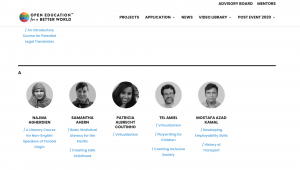
The projects I have been mentoring are:
- Basic Statistical Literacy for the Pacific (2018/19)
- Creating Safe Childhood (2019/20, ongoing), and
- Creating Interactive Content in Moodle (2020/21, ongoing)
Mentoring these projects has enabled me to develop an understanding of different international contexts and approaches to developing OER. The projects Creating Safe Childhood and Creating Interactive Content in Moodle are both based in India, this has understandably led to some delays in the course development due to the Covid-19 pandemic and some personal health issues of the lead developers.
Key considerations have been the scheduling of the mentor meetings due to time zone differences and the platform used for the meeting. The Statistical Literacy project was based in Fiji, as there was a poor internet conenction all mentoring calls were voice only.
UCL OpenEd Special Interest Group
For the last few years I have been an organising member of UCL’s Open Education special interest group. After the pausing of funding for OER Respository project (OpenEd@UCL), focus switched to maintaining and developing an open education community within and across the institution.
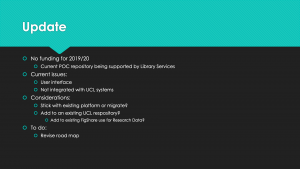
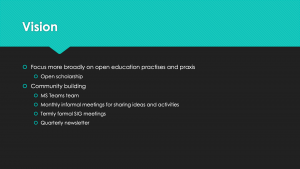
Working with colleagues from both the Digital Education and Library Services team I planned a relaunch meeting for the SIG and created community spaces in MS Teams. One for the SIG co-ordinators and one for the SIG members. I also arranged with Research IT Services to shre their drop-in space monthly to host informal meet-ups for discussion of open education related issues and to share practice. The sessions were intially moved online during the early stages of the pandemic but since early 2021 these have been put on hold due to low attendance and workload issues.
December 2019 OER SIG full presentation (.pptx)
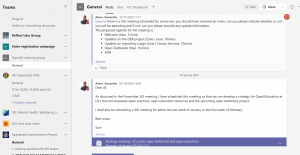
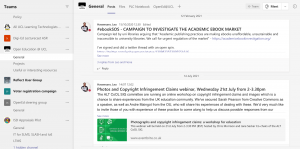
Other activities have included producing a number of posts on the UCL Digital Education team blog. One of the posts written shortly before the pandemic was aimed at encouraging colleagues to make use of the Wikimedia Foundation suite as part of their pedagogy, whereas one was aimed at supporting colleagues who had recently transitioned to remote teaching.
Reflection
Throughout my career thus far I have demonstrated open praxis. In the approach to my research, the materials I develop and professional development. Although I create and share resources, these are not always done so with a CC license attached, and as such are default subject to copyright which isn’t usually the intention.
I do have some concerns with regards to open and the risk of backdoor colonisation of education and knowledge. There is also privilege attached to be able to demonstrate open praxis. I have been fortunate to have a fee waiver for the open access publication of a research article in a well known journal. There are open access journals that do not charge these fees, but these do not always have the prestige or visibility of other journals.
More specifically with regards to OER, I particular like being involved with OE4BW as I am supporting developers in their contexts to solve relevant issues to them, in a contextually appropriate way. Although I am aware that I bring my own values, pedagogic preferences and unconcious biases to these discussions.